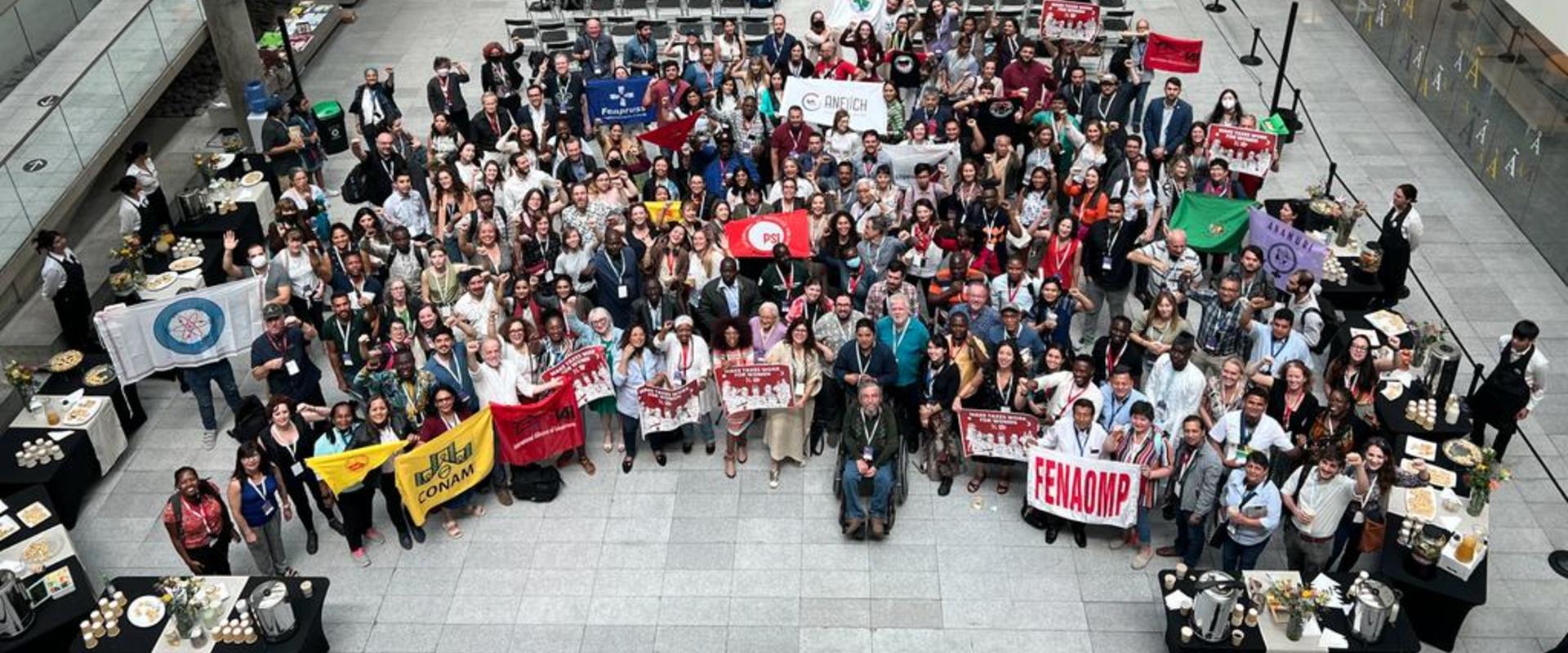|
A large movement is building and concrete solutions are emerging to counter the dominant paradigm of growth, privatisation and commodification.
Was this forwarded to you? Sign up
here
|
|
Dear reader,
At a time when the world faces a series of crises, from the environmental emergency to hunger and deepening inequalities, increasing armed conflicts, pandemics, rising extremism, and escalating inflation, a collective response is growing. A large movement is building and concrete solutions are emerging to counter the dominant paradigm of growth, privatisation and commodification.

From 29th November to 2nd December 2022, over a thousand representatives from over one hundred countries, from grassroots collectives, advocacy, human rights, and development organisations, Indigenous representatives, feminist groups, trade unions, and other civil society organisations, met in Santiago, Chile, and virtually, to discuss the critical role of public services for our future.
One of the main outcomes of the conference was the Santiago Declaration for Public Services, a call to reimagine a truly equitable and human rights oriented economy that works for people and the planet.
For more context, see this article, which is a review of the evolution of political and academic debates on public ownership in general and public services provision in particular over the last decades, with emphasis on the energy sector. Taking as a temporal and analytical reference the research and advocacy work developed by the authors and other scholar-activists based at the Transnational Institute from 2006 to the present.
|
|
|
|
|
|
|
|
This paper looks at the series of plans developed by the UK Labour Party under the progressive leadership of Jeremy Corbyn between 2016 and 2019 for re-establishing public ownership and operation of services and infrastructure which had been privatised over the previous 40 years.
Read more
|
|
|
|
|
|
|
|
|
|
|
Since Russia’s full-scale invasion of Ukraine in February 2022, western governments have pledged unprecedented financial support to militarism, citing the threat posed by the war as justification. Political leaders have repeatedly deemed this response to be reasonable, proportionate, and necessary to support Ukraine’s war effort and to deter Russia from advancing further westward.
Read more
|
|
|
|
|
|
|
|
|
|
|
This study on the state of the energy sector in Tunisia (including renewable energy) is based on the key premise that energy is not a profit-making commodity, but a right. The study argues that access to energy and its production are political questions in essence, rather than purely technical ones. Drawing on a redistributive justice viewpoint, it addresses the following questions: Who owns what? Who does what? Who gets what? Who wins and who loses? Who benefits from the collective public good?
Read more
|
|
|
|
|
|
|
|
|
|
|
Indonesia’s empty climate promises and commitment to coal today are a reflection of short-sighted and pro-capital policymaking at a time when the planetary implications are catastrophic. This issue brief unpacks the details of how Indonesia's production of coal is being ramped up rather than phased out.
Read more
|
|
|
|
|
|
Fintech is being sold throughout the world as the new panacea to poverty, promising financing to anyone with a mobile phone. However, driven by investors and venture capitalists seeking short-term returns, it often leaves people and communities with unmanageable debt burdens and facing increasing poverty and vulnerability. The city of Maricá, Brazil, is pioneering a community-based model of Fintech. Could it point to a different path for addressing vulnerability and building long-term sustainable development?
Read more
The Emergence of the ULA/AA and Question of the Rohingya Crisis
A Myanmar Commentary by Kyaw Lynn
While conflict continues in Myanmar in the aftermath of the military coup, the political crisis in Rakhine State is often overlooked. Here the Rohingya emergency shows no sign of ending, but the growing strength of the United League of Army/Arakan Army is changing the landscape on the ground. In the aftermath of a ‘humanitarian’ ceasefire, Kyaw Lynn analyses political trends in this commentary, examining why the ULA/AA has become an influential actor in any likely resolution of the Rohingya crisis. Inter-community approaches and understandings will be key.
Read more
|
|
|
|
|
|
|
|
What are the economic challenges facing the Global South post-pandemic? What role have global financial institutions like the World Bank and the IMF played in worsening the economic situation for poorer countries? And what economic alternatives might exist?
In this interview, Jomo Kwame Sundaram shines a light on the effects that decades of liberalisation policy have had on countries in the global South, including deindustrialisation, food insecurity, and another looming debt crisis. He argues that the recent refusal to waive international property rights related to vaccines as well as sanctions on China have worsened the situation, with the odds increasingly stacked against poorer countries.
Subscribe to State of Power on
Spotify
,
TuneIn
or
AudioBoom
|
|
|
|
|
|
|
18:00-20:00 CET - Maison des Associations Internationales, Rue Washington 40, Brussels
After the Covid-19 pandemic, the severe, multidimensional, and structural crises afflicting the world have only deepened, especially in the Global South. The war in Ukraine and its consequences continue to challenge most economies, but in the Global South, they are compounded by a persistent debt crisis and a climate emergency these countries have done little to cause.
Bridging four continents, and co-organised by the Transnational Institute, CADTM and The Left group in the European Parliament, this international conference is a space to build convergences, an invitation to a critical and holistic perspective on these multiple interconnected crises.
Register here
|
|
|
|
|
|
|
|
|
|
|
| | | |